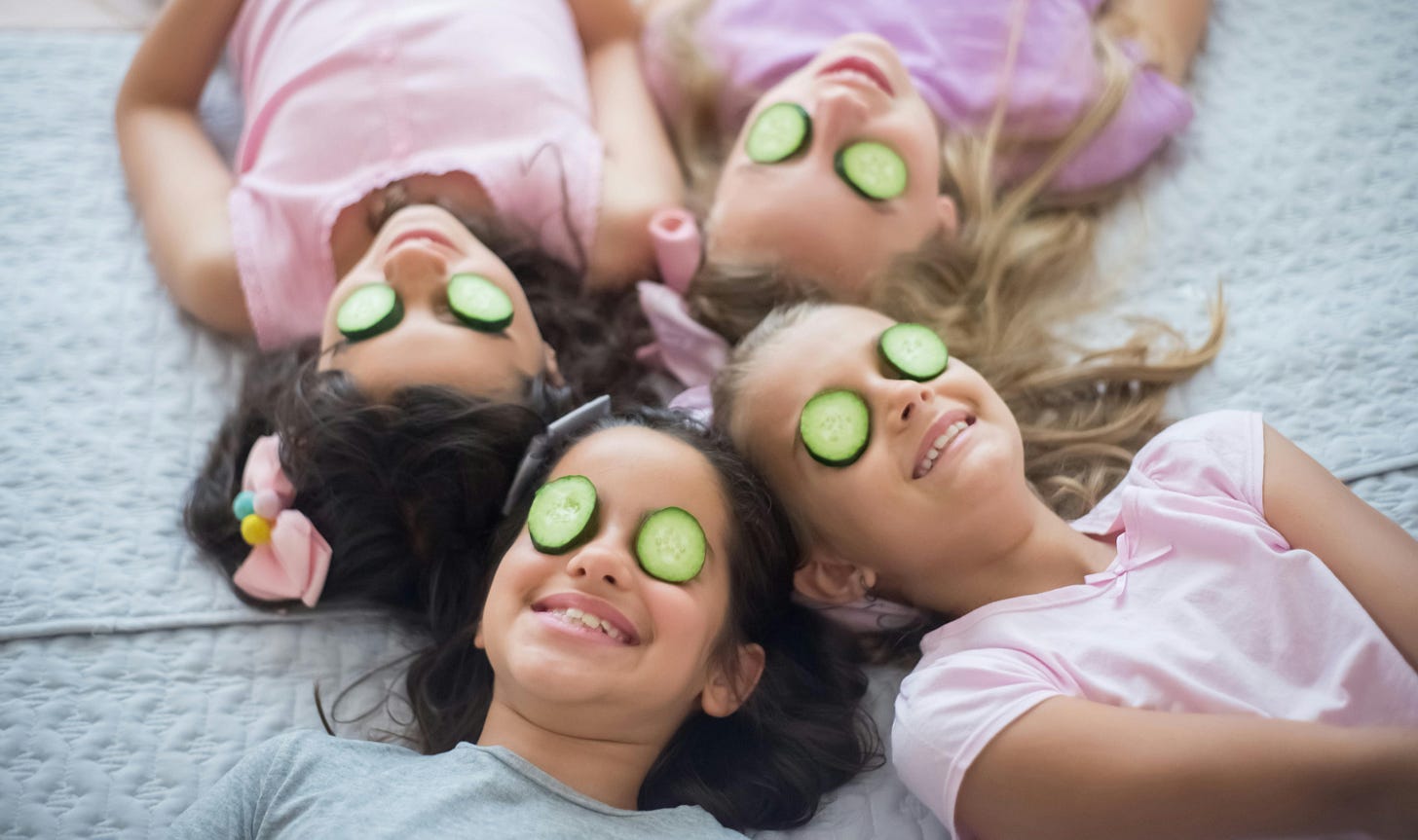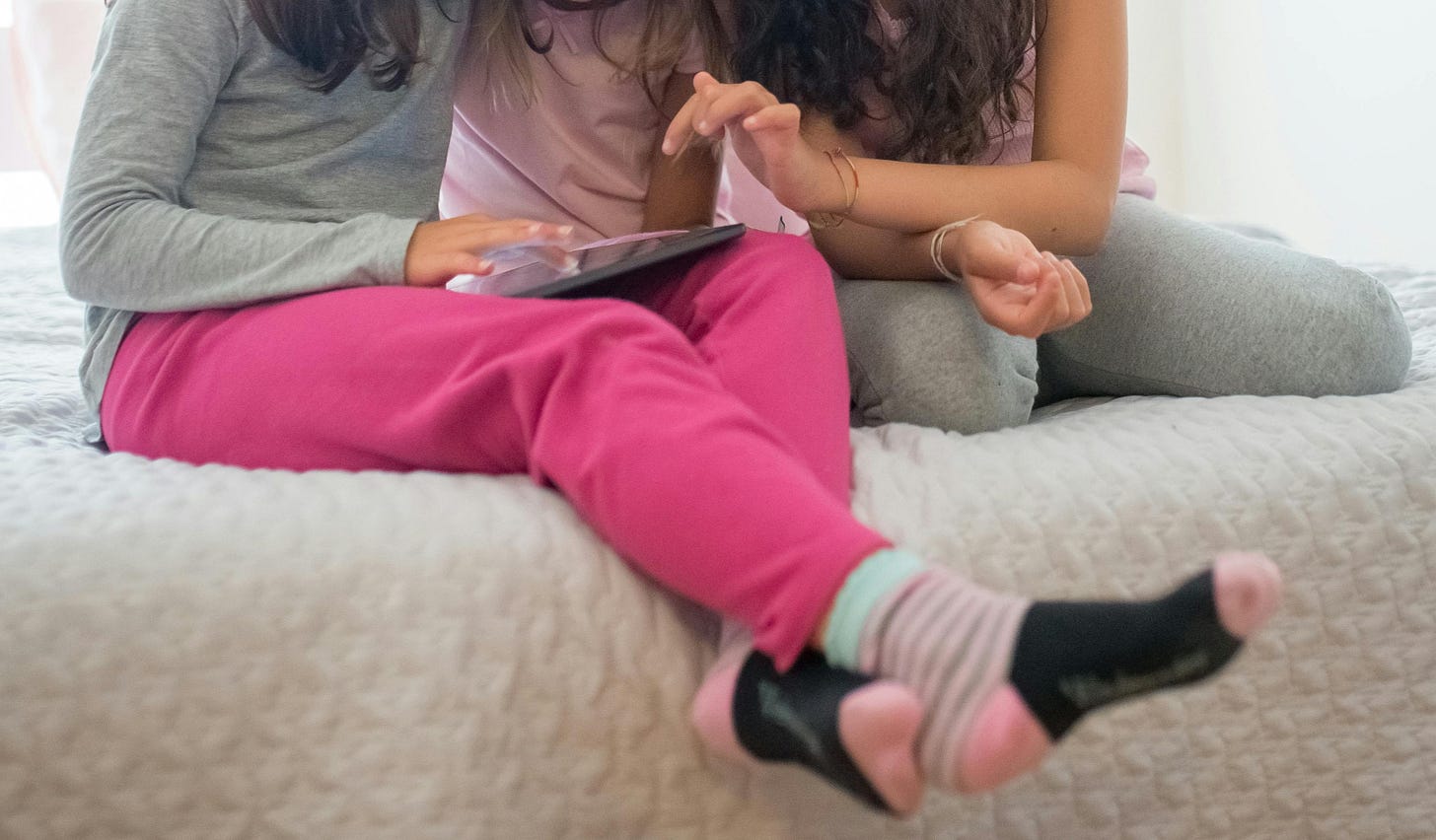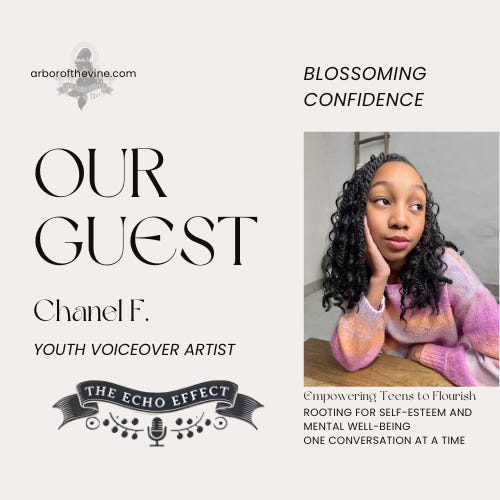In this episode of The Echo Effect’s Echolettes miniseries, Chanel joins the conversation not as a polished pundit, but as a deeply self-aware teen navigating the complex emotional terrain of adolescence. What she offers is not a manual; it’s insight. She shares her perspective. It’s vulnerable and brave. Her honesty doesn’t pretend the road is always smooth.
Interview and article by Jenny Cline featuring Chanel F., Echoes & Vine Magazine Youth Voiceover Artist
Chanel speaks with rare clarity, like the quiet steadiness of someone who’s learned to appreciate the beauty of a passing storm rather than simply tolerate the rain. At twelve years old, her voice carries modesty and poise as she reflects on mental health, social pressures, and the surprisingly astute intuition of asserting, “I need a break.”
“When things get too much,” she shares, “I’ve learned to slow down. I listen to music, draw, play with friends, or talk to my mom.”
The simplicity of her methods belies their strength. Her strategies, grounded in presence, connection, and permission to pause, mirror therapeutic models of self-regulation and mindfulness, yet they come without jargon or pretense.
As adults, National Teen Self-Esteem Month is our cue to reflect on the similarities of shared challenges. It’s also an opportunity to recognize the inner resources young people cultivate daily. Statistics from Mental Health America reveal that over 20% of U.S. adolescents report experiencing a major depressive episode in a given year, a sobering reminder that mental health conversations are essential, not optional. Yet Chanel’s story offers a compelling counterbalance: a vision of resilience emerging from within a tempest, not in spite of it.
In the space between online personas and offline emotions, Chanel is refreshingly honest.
“Social media is kind of like a mixed bag,” she laughs. “It’s wonderful, but it can also play games with your head.”
With nearly half of teens online almost constantly (Pew Research Center 2024), her approach feels vital.
Rather than abstain altogether, she curates her digital experience with intention: unfollowing accounts that drain her energy, limiting screen time, and embracing the beauty of posting without polish.
“No pressure, no stress,” she shrugs. “If it’s silly or just for kicks, that’s okay.”
There’s wisdom in that nonchalance. Chanel is practicing something more advanced than it appears: emotional boundary-setting, digital discernment, and the art of showing up authentically in a world that often rewards the opposite. Her approach echoes emerging research that ties healthy social media habits to improved mood and self-perception, especially among teens who actively filter content and engage positively.
Chanel’s insight shines most in her reflections on friendship. It’s the kind that heals, holds, and honors truth. “A good friend is someone you don’t have to pretend with,” she says. Her description is warm and textured: friends who cheer her on when she’s thriving and convey her worth when she’s unraveling. 64% of teens today report having supportive friend networks (Lenhart 2015), so what Chanel and her friends share is authentic.
She recalls one moment when she noticed someone being left out during lunch. “I just asked if they were okay,” she explains. “Even that can be kind of magical.” These acts of micro-kindness, often overlooked, have ripple effects. They model a kind of leadership that doesn’t require a podium, just presence. Chanel, in her glimmering way, exemplifies what it means to be emotionally fluent and socially courageous.
Still, she’s no stranger to pressure. Whether it’s the subtle tug of peer expectations or the overt sting of bullying, she’s learned to anchor herself in something deeper: self-trust. “Good friends don’t pressure you; they encourage you,” she says, matter-of-factly. The line lands with the weight of lived experience. It’s not just advice—it’s a boundary.
Her generation is growing up in parallel with a society still learning how to prioritize mental health. While 31.1% of adults experience anxiety disorders (NIMH n.d.), only 43% of those with mental illness receive care (The Zebra 2024). Teens, in some ways, are adapting faster. They are speaking more openly, seeking support, and challenging stigma head-on.
Yet it’s not just about grit alone. It’s about care. Chanel’s approach to well-being is deeply relational. She checks in with herself and others, gives space when needed, and asks for help without shame.
“It doesn’t mean there’s something wrong with you,” she says. “It just means you’re taking care of yourself.”
Her message is disarmingly mature: that confidence isn’t loud, and strength isn’t stoic. Sometimes, it’s as small as saying: “Not today” to pressure, “yes” to rest, or “hello” to the kid sitting alone. These are the genuine acts that build self-esteem from the inside out, like watering the roots rather than polishing the crystal vase.
To see Chanel engage with the world around her is to witness the unfolding of a young woman who knows herself and is still becoming. She is a counterpoint to headlines that paint a portrait of crisis, the lived experiences of teens like her sketch something more nuanced: a generation learning, leading, and nurturing their way toward a positive emotional future.
For anyone connected with teens, or for those who simply want a fresh outlook on resilience, this episode is essential listening. Chanel doesn’t just share strategies; she offers perspective. In doing so, she reminds us that even amid challenging winds, your values keep you grounded.
Disclaimer: This article is intended to provide motivational and inspirational content. However, if you are experiencing thoughts of depression, suicide, or other mental health concerns, please seek help from a qualified medical or mental health professional.
In the United States, you can call the National Suicide Prevention Lifeline at 1-800-273-TALK (8255) or text the Crisis Text Line at 741741.
For international emergency mental health support, please visit helpguide.org, which lists global helplines and crisis centers.
Remember, mental health support is available, and there is help for those who need it.
Tune in on May 7th for the full podcast with Chanel on The Echo Effect's 'Echolettes' series, only on Spotify.
References:
Lenhart, Amanda. 2015. "Teens, Technology and Friendships." Pew Research Center. August 6, 2015. https://www.pewresearch.org/internet/2015/08/06/teens-technology-and-friendships/.
National Institute of Mental Health. n.d. "Any Anxiety Disorder." National Institutes of Health. Accessed February 2025. https://www.nimh.nih.gov/health/statistics/any-anxiety-disorder.
Mental Health America. 2024. "Youth Data 2024." Mental Health America. Accessed February 2025. https://mhanational.org/issues/2024/mental-health-america-youth-data.
Pew Research Center. 2024. "Teens, Social Media and Technology 2024." Pew Research Center. Accessed February 2025. https://www.pewresearch.org/internet/2024/12/12/teens-social-media-and-technology-2024.
The Zebra. 2024. "Mental Health Statistics in 2025." The Zebra. Accessed February 2025. https://www.thezebra.com/resources/research/mental-health-statistics.
Read more from Chanel.

















